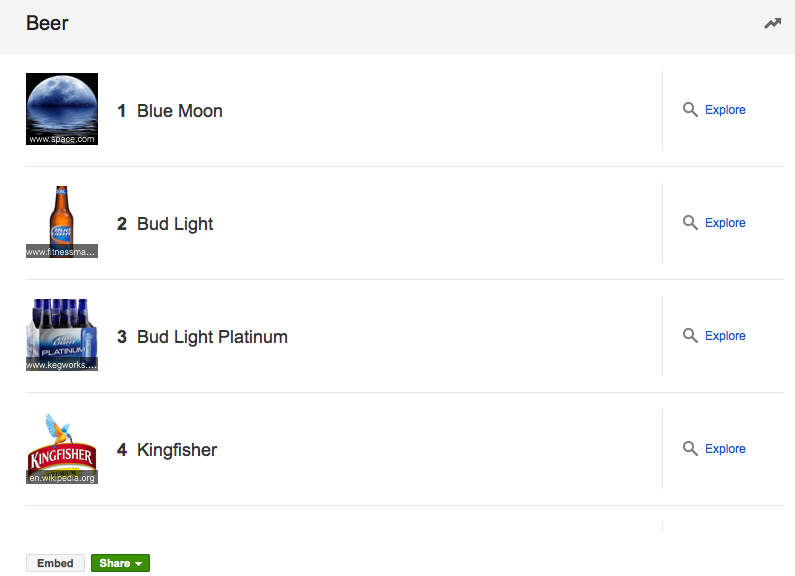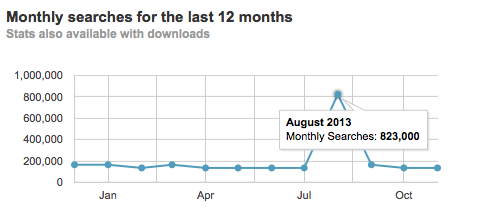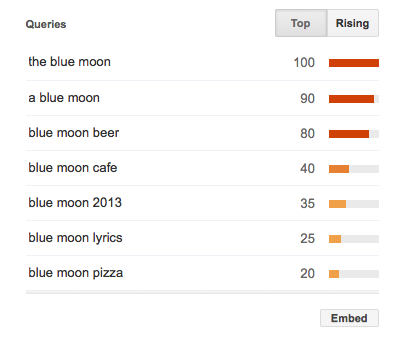
Is Blue Moon really the most searched for beer of 2013?
Google recently published its list of the top Google Trends of 2014, but they made an enormous mistake with one of their charts. As you can see in the image to the right, they crowned Blue Moon as the “most searched for” beer of 2014. This seemed a bit suspicious to me, and after a few minutes of research, I discovered why Google was in all likelihood mistaken to include it at the top of the list, and if you read my explanation below, you will get a better understanding of how to avoid making keyword research mistakes when you encounter “ambiguous keywords.”
Here is what I did:
- First, I looked at the keywords themselves for clues. Of the top 4 beer brands displayed to the right, “Bud Light” and “Bud Light Platinum” are not at all ambiguous. Both mean beer. However, Kingfisher is a type of beer, a type of bird, and may refer to many types of fish, and it is also a word that can be trademarked by many, many businesses as part of a larger name. Meanwhile, Blue Moon might refer to the phases of the moon, the song “Blue Moon Rising,” or other products whose names incorporate the words “Blue Moon.” Therefore, the volume around the keywords “Kingfisher” and “Blue Moon” are going to be inflated right off the bat.
- Then, I used Google Trends to take a look at the monthly distribution of keyword searches for “Blue Moon” — you’ll see in the graph below that during an ACTUAL Blue Moon in 2013, the keyword searches skyrocketed:

- Then, using the Google Keyword Planner, I took a look at the actual keyword volume distribution over the months of 2013 for the phrase “blue moon” — you’ll see that the spike was very meaningful, with more than 4x the searches during the peak as all the other months of the year:

- Then, I dove into the actual queries themselves that are related to the term “Blue Moon” to see if people are highly interested in some specific alternative topics that use the phrase “blue moon” but that are NOT the beer (you’ll see below that there is plenty of evidence of this). In fact, it appears that people searching for “the blue moon” and “a blue moon” are far more prevalent than people looking for beer specifically:
 Lastly, you can do an old-school SEO trick by going to Google.com, and searching for the following: “allintitle:blue moon cafe” which will reveal how often a keyword appears in the page title tags of websites. In this case, you can see that 20,000+ pages are using “blue moon cafe” in their page title tags. This is of course additional evidence that probably most of the keyword searches for “blue moon” are NOT people who are hoping to find beer.
Lastly, you can do an old-school SEO trick by going to Google.com, and searching for the following: “allintitle:blue moon cafe” which will reveal how often a keyword appears in the page title tags of websites. In this case, you can see that 20,000+ pages are using “blue moon cafe” in their page title tags. This is of course additional evidence that probably most of the keyword searches for “blue moon” are NOT people who are hoping to find beer.

There is tremendous evidence, as you can see, that suggests that “Blue Moon” does NOT deserve the title of the most searched for beer of 2013. But my real purpose in writing this post is to show you the perils of ambiguous keywords. Obviously, if you are one of the thousands of businesses who use some variation of the keyword “blue moon” in your name, you certainly don’t want to pay for 1,000 clicks for every one potential customer. You could blow through an AdWords budget worth hundreds of thousands of dollars on “Blue Moon” before you ever showed your ad to a potential customer.
You deal with ambiguous keywords like these through proper use of match types, geo-targeting, unambiguous ad text, day-parting, and by using other features in Google AdWords that allow you to target potential customers, rather than just paying for irrelevant clicks.




